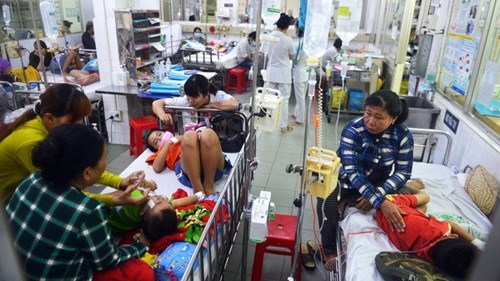Measles was on the rise in the northern region with 3,000 cases and one death reported in 10 localities.
Meanwhile, in the hotter and more humid southern region where the number of measles cases steadily increased, outbreaks of hand-foot-and-mouth and dengue fever are showing little sign of slowing. More than 60,000 cases of hand-foot-and-mouth and approximately 67,000 cases of dengue fever have been recorded so far, with patients disproportionately living in the south. Ten were killed by those two diseases.
    |
 |
|
Children with dengue fever at the Children 1 Hospital in Ho Chi Minh City. Photo: tuoitre.vn |
In an online Q&A session on preventive measures against infectious diseases held by the Tuoi Tre (Youth) newspaper on October 23, Dr Nguyen Trong Toan, deputy head of the Disease Control and Prevention Department of the Ho Chi Minh Pasteur Institute, said that the key to protect a community from a disease was to make sure the vaccination coverage in that community reached a certain high percentage.
“Such a coverage rate combined with the effectiveness of the vaccines will build up a barrier of immunisation to protect the community from being disrupted by the disease or having it transmitted from one to another,” Toan said.
The measles virus, for example, exists in Vietnam throughout the year, he said. However, it will only break out in communities where the immunisation coverage failed to reach 95 percent.
That would explain why a majority of measles cases in the south concentrated in HCM City and Dong Nai and Binh Duong provinces - the three localities attracted a large number of migrants and hence it was hard to control the vaccination coverage, Toan said.
“A dense, ever-changing population together with existing viruses and hot and humid climate will contribute to the spread of the diseases,” he said.
While infectious diseases can be transmitted to anyone, young children are always the most vulnerable due to their immature immune systems, said Dr Ngu Duy Nghia, head of the Department of Infectious Disease Control of the National Institute of Hygiene and Epidemiology.
The northern region of Vietnam was starting to enter winter with huge differences in temperature and humidity between days in a week or day and night, he said. That would bring along potential outbreaks of particular diseases like flu, measles, rubella, chicken pox and mumps.
“It is of the utmost importance to have the children vaccinated against those diseases in line with the vaccination schedule,” Nghia said, especially as many vaccines are already provided free through the national vaccination programme.
With diseases like hand-foot-and-mouth or dengue fever, for which vaccines are not yet available in Vietnam, he advised families to pay more attention to personal hygiene by washing hands with soap several times a day and regularly sterilising the children’s utilities and toys. To avoid dengue, people should take care to limit exposure to mosquitoes.
Parents should also refrain from bringing their children to crowded places to reduce the chance of catching a disease, especially when they are not fully vaccinated, Nghia said.
Source: VNA